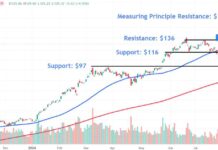Stock markets in both the United States and Japan have recently experienced significant downturns, causing panic among investors. In the U.S., the Nasdaq 100 index, which is heavily influenced by tech giants, has dropped by over 10% since mid-July. Similarly, Japan’s Topix index has seen losses in the double digits, including a 6% decrease on August 2nd, the largest single-day drop since 2016.
This sudden shift in market sentiment has led to a surge in volatility, with the VIX index, known as Wall Street’s “fear gauge,” reaching levels not seen since the regional banking crisis in the U.S. last year. This increase in expected volatility has left investors scrambling to protect their investments and navigate the uncertain market conditions.
During times of heightened market volatility, it is essential for investors to understand and manage their fear to make informed decisions. Fear can often lead to irrational behavior, such as panic selling or making impulsive trades, which can result in significant losses. By taking a step back and assessing the situation objectively, investors can avoid making decisions based on emotions and focus on their long-term investment goals.
One way to overcome fear during market volatility is to stay informed and educated about the factors driving the fluctuations. By understanding the underlying reasons for the market movements, investors can better anticipate potential risks and opportunities. Additionally, diversifying one’s portfolio can help mitigate the impact of volatility on overall returns, as different assets may react differently to market conditions.
It is also important for investors to have a clear investment strategy in place to guide their decisions during turbulent times. Establishing a well-defined plan based on individual risk tolerance and financial goals can provide a sense of direction and prevent knee-jerk reactions to market fluctuations. By sticking to a disciplined approach and avoiding emotional decision-making, investors can maintain a long-term perspective and ride out the storm of market volatility.
In conclusion, navigating market volatility requires a combination of understanding, preparation, and discipline. By managing fear, staying informed, diversifying portfolios, and following a solid investment strategy, investors can weather the storm and position themselves for long-term success in the ever-changing world of finance.

















